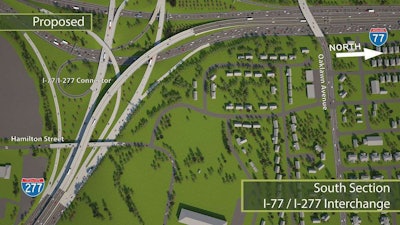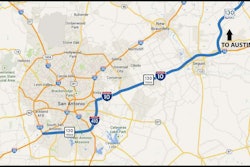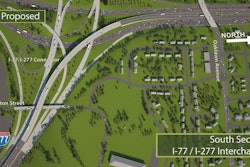 Rendering of the proposed I-77 expansion from the North Carolina Department of Transportation.
Rendering of the proposed I-77 expansion from the North Carolina Department of Transportation.North Carolina is reexamining a Cintra subsidiary’s contract to add toll lanes to I-77 after a separate division of the corporation became the second of its subsidiaries holding a road contract with a state to file bankruptcy since 2014.
NCDOT Secretary Nick Tennyson apparently has said little about a March 6 meeting with Texas DOT officials after the Lone Star State’s SH 130 Concession Co. filed Chapter 11 this month. “The governor has directed us to immediately review every available option – both legal and financial – to reassess the I-77 Mobility Partners’ business model and current contract,” Tennyson said.
Last month, North Carolina’s project to add optional toll lanes to 26 miles of I-77 through Charlotte via I-77 Mobility Partners cleared final hurdles. Tennyson said his state’s contract with that Cintra division protects taxpayers from financial losses.
Cintra said the SH 130 Concession Co. reorganization will not financially impact I-77 Mobility Partners building and operating I-77 express lanes. “While Cintra is an equity sponsor of both projects, each project maintains a separate financial structure. This matter has not impacted our construction schedule and we look forward to continuing our work here in North Carolina.”
The bankruptcy also will not affect Texas drivers, said Cintra spokesman Patrick Rhode. State dollars did not build SH 130 segments 5 and 6 at a cost of $1.4 million and Texas will not be liable for the project’s debt. The state’s concession agreement with the subsidiary protects taxpayers, he said.
“Each of Cintra’s projects is wholly independent, with an isolated financial structure that ensures that the performance of one project never impacts the operations of another concession in which Cintra invests,” Rhode said.
In North Carolina, Widen I-77, which recently lost a state court battle against the project, presented arguments against it at a Cornelius town hall meeting March 10. It says taxpayers will wind up contributing to the project and subsiding toll revenue after the private-public partnership builds the 27.5-mile stretch of toll lanes. The group supports a 13-mile public project it says will cost taxpayers $80-$130 million.
Currently, I-77 has one high-occupancy-vehicle lane in each direction, which trucks are prohibited from using. Each HOV lane will become an express lane and a second express lane will be built alongside it on I-77 North and South. The result will be two tolled express lanes in each direction, except between Exits 28 and 36, where one express lane will be built in each direction.
Congestion pricing will set tolls, with drivers paying the most when the express lanes are busiest.
When the project is completed, truckers will continue driving the same two general purpose lanes north and south as they do now. Project proponents say these general purpose lanes will become less congested and traffic will move faster because become some motorists will use the tolls lanes.
Widen I-77 members say numerous U.S. PPPs have failed financially in the past 15 years and in that time period, none retained the same owners.
Cintra’s SH 130 Concession Co. partnered with the Texas-based Zachry American Infrastructure to build 41 miles of SH 130 from north of Mustang Ridge to Seguin. Despite opening in 2012 with an 85 mph speed limit, use of the privately operated toll road was lower than projected.
Underuse of the Indiana Toll Road also resulted in another Cintra division, ITR Concession Co., to file Chapter 11 in 2014. In 2006, it signed a 75-year lease on the 157-mile highway between the Ohio Turnpike and Chicago Skyway. Last year, Australia’s IFM Investors bought the road’s operating rights during the bankruptcy proceedings.










